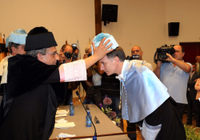"The humanities are not to be overlooked as unfashionable knowledge. They represent a hope for the future"
 1
/
1
1
/
1

Investiture speech given by Antonio Soler as doctor honoris causa
The Senate of the University of Malaga has just received Antonio Soler as new doctor honoris causa. It has done so following the traditional ceremony with which our predecessors invited illustrious men of science and the humanities to join the faculty.
We welcome our new doctor whose works are greatly admired and whose creativity and literary passion never cease to fascinate. Antonio Soler today receives the distinction awarded by the University of Malaga to those who have achieved excellence.
This distinction is given to individuals who, while still creative, are already being held up for posterity.
Today, perhaps Antonio Soler still lives together with his childhood self of the sixties and seventies, solitary, thoughtful. From the school bus, the young Soler watched, and maybe sensed, the scene of his work, the esplanade - sometimes dry, sometimes a quagmire - near the army barracks on Eugenio Gross Street, Gamarra, where a circus sometimes stood. It was like discovering the world in a grain of sand. It was life observed from a distance. The city of memory. The Malaga which would later appear in his literature, and let’s not foreget, it was a long walk from the Camino de Antequera to the Camino de los Ingleses, and it was during this time the writer began to find the material for his works.
The inscrutable mystery of these mechanisms, which transmute life experience, memory or imagination into a novel.
Few things are as difficult to grasp as the creative act. Apparently there are no roads, no rules. Perhaps this is why some evoke the Greek muses, who appeared without warning and only favored those who were working. But literature is also science, as Joyce says, in its grammar and characters.
Most learning happens within the writer himself. His work can only arise from the uniqueness of his own world. And that uniqueness, paradoxically, is where the universality of his work is born, and is where the writer joins the world.
Today the words of Antonio Soler add a new voice in the Senate of a public university that defends the arts - a voice that speaks of ethical commitment, talent and willpower.
Language and Literature, History, Philosophy and the Arts, are fundamental pillars of our civilization, our culture. They serve to articulate critically thought itself, to discern, to form a judgment. They contain in themselves a passion for beauty, for a more humane world, a freer, and, therefore, a better world.
It would be unfortunate if therefore, swayed only by goals of profitability, educational policies were designed only to reap immediate benefits - that those responsible for the future, put aside creating critical citizens, citizens with the ability to question and participate in educated decision-making.
But it would be even worse if universities resigned themselves to it. Because the day that happens, the day the obsession with profitability stifles critical, free and creative thinking, we will fall into intellectual impoverishment, precariousness of ethical discourse - and our way of life will lose cohesion.
No democracy can be strong and stable if not supported by critical, active citizens, capable of disagreeing. Democracy needs the arts.
We have experienced a crisis of global dimensions. It is not just the economic crisis; under it underlies another that is not always perceived, but can be more devastating for the future of democracy. It is a crisis of values, an ethical crisis that also affects the educational model.
Sometimes it trains young people in the idea that only experimental sciences and technology can lead to success and therefore economic enrichment. This obsession with quick profit is taking away not only culture but the very concept of social coexistence.
Public universities have to play a major role in the defense of the arts, as the only authority that assists us: the authority of reason. We're doing it a lot. The arts are not waste or outdated knowledge. They represent hope for the future and must go together with experimental science and technology, because together they contain the knowledge our society needs.
Knowledge is necessary to think critically, to overcome nationalism and think globally, as world citizens. It is necessary to understand other people and see them as people who love and suffer and feel, and not as mere instruments that produce, or as faceless opponents in a competitive world. The arts, and specifically literature, help us put ourselves in the shoes of others. To understand others and the fiction which reconstructs human dimensions of the past?
What is literature for? “Nothing,” Saramago said, sarcastically - but actually the act of reading is what makes us human beings. Literature encourages us to learn new models with which to build reality.
Antonio Soler is a consecrated as a Spanish figure of literature. Undisputed master of the novel, his prose always accompanies those who aspire to contemplate life and the future with a book in hand. We meet his characters daily, so Antonio Soler's novels remind us of our own history. So tumultuous and rich in experiences, so rich in characters. Writing is always a challenge to time, and the history of literature continues in the past, but does not cease to live for the future. Literature is a relay race in which the book is the torch that lights up all times. The torch that illuminates us this afternoon when we pay tribute to a writer, a humanist with values bound to life.
Antonio, Miguelito Dávila claims that paradise never existed; It was only what men “manufactured in their heads.” We work together to build this paradise of educated free men.
Antonio Soler, thank you for accepting this award, and welcome to the Senate of the University of Malaga.




